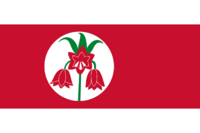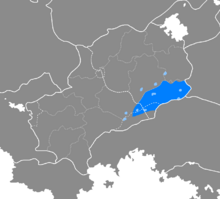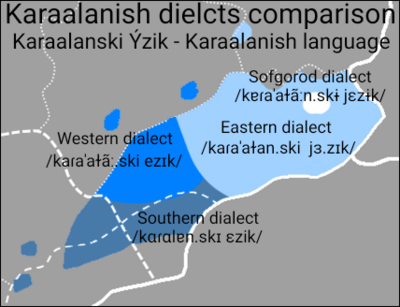Karaalani language: Difference between revisions
Native Qazh (talk | contribs) |
Native Qazh (talk | contribs) No edit summary |
||
| Line 96: | Line 96: | ||
The '''Karaalani language''' is a [https://en.wikipedia.org/wiki/Slavic_languages Slavic language] from the [[Kento-Poylash languages|Kento-Polyash language group]], and is the co-official language of the Karaalan region of [[Monte Blanco]], [[Mustelaria]], and the 4th most spoken langauge in [[Mustelaria]]. | The '''Karaalani language''' is a [https://en.wikipedia.org/wiki/Slavic_languages Slavic language] from the [[Kento-Poylash languages|Kento-Polyash language group]], and is the co-official language of the Karaalan region of [[Monte Blanco]], [[Mustelaria]], and the 4th most spoken langauge in [[Mustelaria]]. | ||
=Phonology= | |||
==Consonants== | |||
{| class="wikitable" style="text-align:center" | {| class="wikitable" style="text-align:center" | ||
|- | |- | ||
| Line 155: | Line 155: | ||
==Vowels== | |||
{| class="wikitable" | {| class="wikitable" | ||
! | ! | ||
| Line 178: | Line 178: | ||
|} | |} | ||
=Writing System= | |||
Karaalani officially uses the {{wp|cyrillic script|Govoric script}} but it also has adapdet co-official {{wp|Coptic alphabet|Protopolyash}} and {{wp|Latin script|Latin}} forms. | Karaalani officially uses the {{wp|cyrillic script|Govoric script}} but it also has adapdet co-official {{wp|Coptic alphabet|Protopolyash}} and {{wp|Latin script|Latin}} forms. | ||
=Grammar= | |||
==Pronouns== | |||
= | ==Nouns== | ||
===Gender=== | |||
= | ===Case & Number=== | ||
== | |||
== | |||
Karaalani has 6 [https://en.wikipedia.org/wiki/Grammatical_case grammatical cases]. | Karaalani has 6 [https://en.wikipedia.org/wiki/Grammatical_case grammatical cases]. | ||
*[https://en.wikipedia.org/wiki/Nominative_case Nominative]: ''Subject'' or a Predicate noun or adjectiv | *[https://en.wikipedia.org/wiki/Nominative_case Nominative]: ''Subject'' or a Predicate noun or adjectiv | ||
| Line 308: | Line 303: | ||
|} | |} | ||
=Adjectives= | ==Adjectives & Adverbs== | ||
= | ==Verbs== | ||
===Tense, Aspect, Mood=== | |||
= | ===Copula=== | ||
=== | |||
==Questions== | |||
==Numerals== | |||
==Dialects== | ==Dialects== | ||
Karaalanish has 4 recognized dialects, the (standart) Eastern, Western, Southern and Sofgorod dialects. | Karaalanish has 4 recognized dialects, the (standart) Eastern, Western, Southern and Sofgorod dialects. | ||
| Line 424: | Line 322: | ||
The Sofgorod dialect conbines nasalization with the the /n/s and pornounces most i's as /ɨ/s and has a lot of 'unstressing'. | The Sofgorod dialect conbines nasalization with the the /n/s and pornounces most i's as /ɨ/s and has a lot of 'unstressing'. | ||
[[File:Karaalanish dialects.png|400px|none]] | [[File:Karaalanish dialects.png|400px|none]] | ||
=Language examples= | |||
===[https://en.wikipedia.org/wiki/Lord%27s_Prayer Lord's prayer]=== | ===[https://en.wikipedia.org/wiki/Lord%27s_Prayer Lord's prayer]=== | ||
Revision as of 10:58, 28 December 2021
This article is incomplete because it is pending further input from participants, or it is a work-in-progress by one author. Please comment on this article's talk page to share your input, comments and questions. Note: To contribute to this article, you may need to seek help from the author(s) of this page. |
| Karaalani language | |
|---|---|
| Karaalan, Karaalanish | |
 Ethnic Flag of the Karaalani people | |
| Pronunciation | // |
| Native to |
|
| Region | Slavic Belt in Thuadia |
| Ethnicity | Karaalani Slavs |
Native speakers | L1: 17,980,000 L2: 1,200,000- FL: 25,000 |
Thuado-Thrismaran languages
| |
Early form | |
Standard forms | Eastern Karaalani
|
| Dialects |
|
| Govoric Script Protopolyash script | |
| Official status | |
Official language in |
|
Recognised minority language in |
|
| Language codes | |
| ISO 639-1 | KR |
| ISO 639-2 | KRA |
| ISO 639-3 | KRA |
 Distribution of the language Absolute majority >30% of native speakers | |
The Karaalani language is a Slavic language from the Kento-Polyash language group, and is the co-official language of the Karaalan region of Monte Blanco, Mustelaria, and the 4th most spoken langauge in Mustelaria.
Phonology
Consonants
| Labial | Alveolar | Palatal | Velar | |||
|---|---|---|---|---|---|---|
| Plosive/ Affricate |
voiceless | p | t | t͡s | t͡ʃ | k |
| voiced | b | d | d͡z | d͡ʒ | ||
| Fricative | voiceless | s | ʃ | x | ||
| voiced | z | ʒ | ɣ | |||
| Nasal | m | n | ||||
| Approximant | ʋ | l~ɫ | j | |||
| Rhotic | ɾ | |||||
Vowels
| Front | Central | back | |
|---|---|---|---|
| Close | i | u | |
| Mid | ɛ | ɤ | o |
| Open | a |
Writing System
Karaalani officially uses the Govoric script but it also has adapdet co-official Protopolyash and Latin forms.
Grammar
Pronouns
Nouns
Gender
Case & Number
Karaalani has 6 grammatical cases.
- Nominative: Subject or a Predicate noun or adjectiv
- Dative: Giving to Subject
- Accusative: Interract with Subject (hear, hit, harm...)
- Locative: In Subject, on Subject
- Vocative: Referring to Subject, calling Subject
| Translation to Common | Singular | Plural | |||||||||||
|---|---|---|---|---|---|---|---|---|---|---|---|---|---|
| Nom. | Dat. | Acc. | Gen. | Loc. | Voc. | Nom. | Dat. | Acc. | Gen. | Loc. | Voc. | ||
| Masculine | |||||||||||||
| Man | Mъж Ⲙϩϧ Măž |
Мъжу | Mъжом | Мъжа | Mъждо | Mъжо! | Mъже | Muзеу | Mъжем | Мъжи | Мъжде | Mъже! | |
| Leader | Войвод | Войводу | Войводом | Войвода | Войводо | Войводе! | Войводи | Войводеу | Войводем | Войводи | Войводе | Войводе! | |
| Feminine | |||||||||||||
| Church | Църква | Църкву | Църквом | Църкве | Църквѥ | Църкво! | Църкви | Църквеу | Църквѥм | Църкви | Църквѥй | Църкве! | |
| Woman | Жена | Жену | Женом | Жене | Женѥ | Жено! | Жени | Женеу | Женѥм | Жени | Женѥй | Жени! | |
| Neuter | |||||||||||||
| Sea | Moре | Moро | Мором | Мора | Морю | Moрé! | Moретa | Moрѣ | Морѣм | Морете | Морѥ | Moрeтá! | |
| Place | Мѣсто | Мѣсту | Мѣстом | Мѣсте | Мѣстю | Мѣстé! | Мѣста | Мѣстѣ | Мѣстѣм | Мѣста | Мѣстѥ | Мѣстетá! | |
Adjectives & Adverbs
Verbs
Tense, Aspect, Mood
Copula
Questions
Numerals
Dialects
Karaalanish has 4 recognized dialects, the (standart) Eastern, Western, Southern and Sofgorod dialects.
The Western and Southern dialects differ mainly from the Eastern and Sofgorod dialects by the fact they dont pronounce the /j/ in the letter Ѣ/Ⳉ/Ý, which in the standert Eastern dialect is pronounced as /jæ~jɜ/, and in Sofgorod as /jɛ/. The Southern dialect dosent pronounce the stress in double characters, like in the word 'Karaalanski' ('Karaalanish'), insted of (standart Eastern) /kaɾaˈaɫan.ski/ it becomes /kɑɾɑlan.skɪ/. It also always pronounces Л/Ⲗ/L as an /l/. The Western dialect has nasal vowels when followed after 'n', some epakers in the far west parts pronounce their r's like /ʁ/s, sum ppl consider it a seperate dialect, tho officially its recognized as an 'accent'. The Sofgorod dialect conbines nasalization with the the /n/s and pornounces most i's as /ɨ/s and has a lot of 'unstressing'.
Language examples
Lord's prayer
Following text shows Lord's prayer written in Karaalani
| Common language | Karaalani (Iraklic) | Karaalani (Protopolyash) | Karaalani (Latin) | |
|---|---|---|---|---|
| Our Father in heaven, | Оче наш, кѫто си нѥбо, | Ⲟϫⲉ ⲛⲁⲋ, ⲕⲓⲱⲧⲟ ⲥⲏ ⲛⲓⲉⲃⲃⲟ, | Oče naš, kyóto si nyebo, | |
| hallowed be your name. | да се свѥти йимем ти, | ⲇⲁ ⲥⲉ ⲥⲃⲓⲉⲧⲏ ⲓⲏⲙⲉⲙ ⲧⲏ, | da se svyeti yimem ti, | |
| Your kingdom come. | да дойде царстѡ ти, | ⲇⲁ ⲇⲟⲓⲇⲉ ϯⲁⲣⲥⲧⲃⲟ ⲧⲏ, | da doyde carstó ti, | |
| Your will be done, | да буде вѡля ти, | ⲇⲁ ⲃⲃⲩⲇⲉ ⲃⲱⲗⲓⲁ ⲧⲏ, | da bude vólya ti, | |
| on earth as it is in heaven. | како нѥбо, тако и земѫ. | ⲕⲁⲕⲟ ⲛⲓⲉⲃⲃⲟ, ⲧⲁⲕⲟ ⲏ ⲍⲉⲙⲓⲱ. | kako nyebo, tako i zemyo. | |
| Give us this day our daily bread | Нѥвний ни хлѣб ним дай нес | Ⲛⲓⲉⲃⲏⲓ ⲛⲏ ⲭⲗⳉⲃⲃ ⲛⲏⲙ ⲇⲁⲓ ⲛⲉⲥ | Nyewniy ni hlýb nim day nes | |
| and forgive us our debts, | и ни прости наши дългове, | ⲏ ⲛⲏ ⲡⲣⲟⲥⲧⲏ ⲛⲁⲋⲏ ⲇϩⲗⲅⲟⲃⲉ, | i ni prosti naši dălgove, | |
| as we also have forgiven our debtors. | како ние проставаме нашите длъжничеу. | ⲕⲁⲕⲟ ⲛⲏⲉ ⲡⲣⲟⲥⲧⲁⲃⲁⲙⲉ ⲛⲁⲋⲏⲧⲉ ⲇⲗϩϧⲛⲏϫⲉⲩ. | kako nie prostawame našite dlăžničeu | |
| And do not bring us into temptation, | И нѥ ним въвеждай ву изкушенѥ, | Ⲏ ⲛⲓⲉ ⲛⲏⲙ ⲃϩⲃⲉϧⲇⲁⲓ ⲃⲩ ⲏⲍⲕⲩⲋⲉⲛⲓⲉ, | I nye nim văvežday vu izkušenye | |
| but rescue us from the evil one. | но ним избави от Лъкави. | ⲛⲟ ⲛⲏⲙ ⲏⲍⲃⲃⲁⲃⲏ ⲟⲧ Ⲗϩⲕⲁⲃⲏ. | no nim izbavi ot Lăkavi. |
